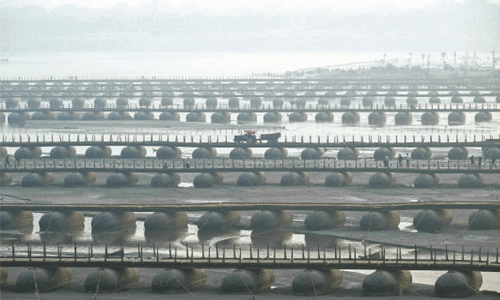During MQM chief Altaf Hussain’s animated press conference on September 9, he talked at length about what he claimed was Karachi’s first militant outfit. Hussain was talking about the enigmatic Thunder Squad (TS) – an armed extension of the Islami Jamiat Taleba (IJT) which, in turn, is the student-wing of the Jamat-i-Islami (JI).
Many of us who’ve been part of student politics in Pakistan’s state-owned universities and colleges are well aware of such a squad. It is also true that long before any major political party constituted armed wings within their respective student units, the TS was the first true manifestation of armed action that not only included student militants but common criminals as well.
The TS has never been officially acknowledged by the JI. Yet it has played a huge role in aggressively maintaining the IJT’s hegemony in various educational institutions in Karachi and Lahore in particular. According to the late Dr Muhammad Sarwar (founding member of the left-wing DSF), the TS began being formulated by the JI in the late 1950s.
Meraj Muhammad Khan (a famous former Marxist student leader of the NSF), suggests the TS began evolving when the IJT failed to break the NSF’s electoral hold in the country’s student unions in the 1960s. Nasir J Razvi, a former NSF activist at Dow Medical College, Karachi, claims that during much of the 1960s, the Thunder Squad was mostly involved in countering leftist sentiments on Pakistani campuses. He says that when the JI was denouncing the PPP/Z A Bhutto and socialism as being anti-Islam, it let lose the IJT goons to disrupt PPP rallies: ‘Most of these goons belonged to the Thunder Squad,’ according to Razvi.
In his book, PPP: Rise to Power, Philip Jones also mentions how the JI used its student wing, the IJT, to attack PPP rallies shortly before the 1970 elections. Various prominent leftist student leaders of the 1970s quoted in the book, Revisiting Student Politics in Pakistan, (by Iqbal H Butt) maintain that the Thunder Squad’s final turn towards violence came when the JI was used by the Pakistani military establishment to help it form militant groups to tackle Bengali nationalist outfits in the former East Pakistan (between 1969-71).
‘Many IJT members joined these groups (Al Badar and Al-Shams)’, said Kashif Durrani, an ex-IJT member at the DJ Science College. ‘A lot of those who managed to return from East Pakistan were soon recruited into the Thunder Squad.’
Naushad Ashraf a former PSF member in Karachi agrees: ‘The Thunder Squad really came into its own in the 1970s. It was constantly brawling with progressive student groups and many Squad members were the first to begin carrying pistols’. He adds that in whichever college or university the IJT managed to win student union elections, it used the TS members as a ‘moral police’. ‘Students, who according to the IJT, were indulging in so-called anti-Islam activities, were beaten up by the Squad members,’ claims Ashraf.
He goes on to say that students in those days did not submit easily to the ways of the TS: ‘Leftist and progressive student groups became aggressive as well. The TS was given a tough time and most campuses largely remained liberal.’
Most commentators on the subject believe that it was the TS that became the first student outfit to introduce sophisticated weapons in campus politics. By the time Z A Bhutto was hanged in 1979 and General Ziaul Haq intensified his repression of progressive student outfits, the TS had come into contact with certain Afghan jihad groups that had begun to gather in Khyber Pakhtunkhwa areas.
According to a former progressive student leader, A. Kaimkhani, the IJT was the first student organisation to use the AK-47 at the Karachi University. Talking to the French author, Laurent Gayer (in 2009), Kaimkhani said that by 1979 the TS was packed with criminal elements that not only brutalised opposing student groups, it also helped Zia’s police to curb left-wing and anti-Zia student activity on campuses. Kaimkhani himself was beaten and handed over to the police by the TS members (for protesting against the Zia regime).
Aqueel Parvez a former PSF man at Karachi University agrees: ‘It was the Thunder Squad who managed to get AK-47s from Afghan jihad groups and then introduce them at the KU and Punjab University (PU)’. After anti-IJT student outfits also managed to get their hands on sophisticated weapons at KU, the TS was let lose (by the IJT) on the emerging All Pakistan Mohajir Students Organisation (APMSO) in 1981.
Throughout the 1980s the TS was involved in brutal violence against progressive student outfits and ethnic student organisations like the APMSO. And since the JI was pro-US in those days (due to US funding for Afghan jihad), I personally know of a number of TS members who migrated to various European and American cities. Thus, today it is quite ironic to see the IJT/TS members burning American flags.
With the rise of the APMSO in Karachi in the 1990s, the TS was said to have moved its operations away from the city’s state-owned colleges. However, it can still be found at PU. ‘Thunder Squad’s hold has weakened in Karachi’, says a KU professor. ‘The TS has now become an entirely clandestine militant arm of the JI. However in the various colleges and universities of Lahore, the TS is still a direct part of the IJT. In Karachi, its sole purpose is to maintain a militant presence around the JI leadership’.
The KU professor who claims to have been attacked by the TS in the early 1980s also suggests that though the TS is very well armed, it has been struggling (in Karachi) to keep pace with the ways of the militant wings of the MQM, PPP and the ANP.
‘These parties have finally beaten the Thunder Squad at its own game’, says the professor, with a smug smile.











































